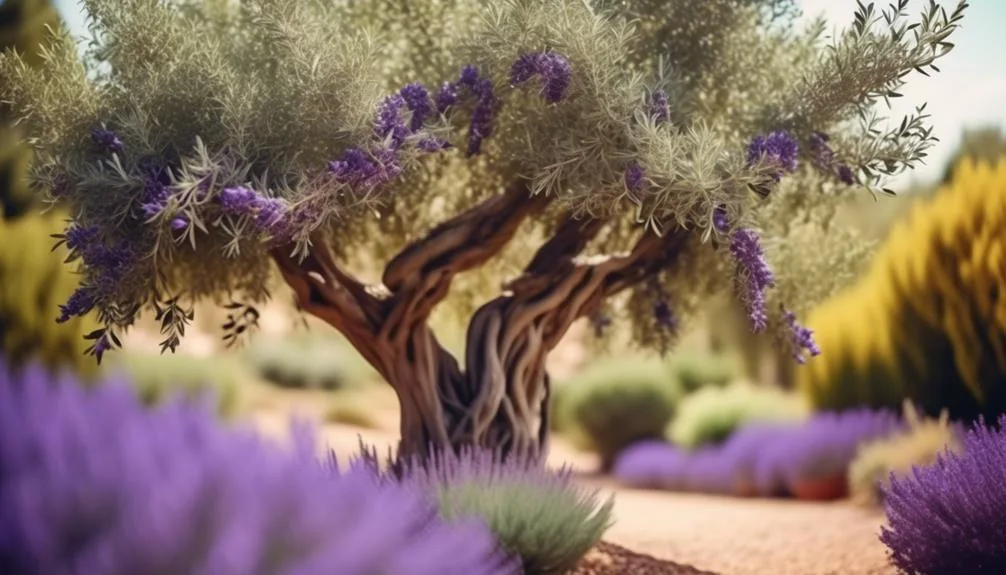Stroll through a peaceful garden with olive trees swaying in the breeze, surrounded by vibrant companion plants.
Companion planting can benefit olive trees, and choosing the right partners is key. From sun-loving plants to those that enrich the soil, the world of companion plants for olive trees offers a range of benefits.
But how do you pick the best companions for your olive grove? Let's explore the world of companion plants for olive trees and discover the perfect botanical partnerships for your garden.
Key Takeaways
- Sun-loving and water-conserving plants such as lavender and rosemary are ideal companion plants for olive trees as they thrive in full sunlight and help conserve water.
- Soil-enriching and nitrogen-fixing plants like clover, vetch, and legumes can enhance soil fertility and reduce the need for synthetic fertilizers, promoting healthier olive trees.
- Pest-repelling plants like basil, thyme, and marigolds can help naturally deter pests and keep olive trees healthy by controlling harmful insects.
- Incorporating beneficial attractant plants, such as pollinator-friendly flowers and water-conserving groundcovers, can enhance the health and productivity of olive trees by attracting bees, butterflies, and birds for pollination and maintaining soil moisture.
Sun-Loving Companion Plants
When choosing sun-loving companion plants for your olive trees, consider species that thrive in full sunlight and complement the natural beauty of the olive tree.
Opt for water conserving companion plants, such as lavender or rosemary, which are drought-tolerant options that thrive in arid conditions. These plants not only conserve water but also add a delightful aroma to your garden.
Additionally, consider flowering companion plants like bee balm or coneflowers, which are pollinator-attracting varieties. Their vibrant blooms won't only enhance the visual appeal of your garden but also attract beneficial insects, aiding in the overall health of your garden ecosystem.
Soil-Enriching Companion Plants
Consider enriching the soil around your olive trees with companion plants that not only complement their beauty but also contribute to the overall health and vitality of your garden ecosystem.
For drought resistance, consider planting lavender, rosemary, or Russian sage. These plants not only thrive in dry conditions but also help conserve water and protect the soil from erosion.
Additionally, nitrogen-fixing companion plants such as clover, vetch, or legumes can enhance the soil fertility by converting atmospheric nitrogen into a form that's readily available to the olive trees. The presence of these nitrogen-fixing plants can reduce the need for synthetic fertilizers and promote a healthier soil structure.
Pest-Repelling Companion Plants
To naturally deter pests and promote a thriving garden ecosystem, integrate pest-repelling companion plants around your olive trees.
Consider planting natural predators such as ladybugs, lacewings, and parasitic wasps, which feed on harmful insects like aphids and caterpillars, thus helping to keep your olive trees healthy.
Aromatic herbs like basil, thyme, and rosemary not only add fragrance and flavor to your dishes but also repel pests such as mosquitoes, flies, and moths. These herbs emit strong scents that mask the odor of host plants, making it difficult for pests to locate them.
Additionally, marigolds and chrysanthemums contain natural insect-repelling properties, keeping nematodes, ants, and beetles at bay.
Beneficial Attractant Plants
Enhance the health and productivity of your olive trees by strategically incorporating beneficial attractant plants into your garden landscape. By planting pollinator-friendly flowers and water-conserving groundcovers, you can create a thriving ecosystem that supports the growth of your olive trees. These attractant plants not only beautify your garden but also play a crucial role in attracting pollinators such as bees, butterflies, and birds, which are essential for the pollination of olive trees. Additionally, water-conserving groundcovers help maintain soil moisture and prevent erosion, creating a sustainable environment for your olive trees to flourish. Consider incorporating these beneficial plants into your garden to promote a healthy and fruitful olive tree harvest.
| Pollinator-Friendly Flowers | Water-Conserving Groundcovers |
|---|---|
| Lavender | Thyme |
| Sunflowers | Creeping Rosemary |
| Echinacea | Sedum |
Space-Optimizing Companion Plants
Incorporating space-optimizing companion plants in your garden landscape can further maximize the health and productivity of your olive trees, building upon the ecosystem supported by beneficial attractant plants.
Water retaining groundcovers such as creeping thyme and clover are excellent choices for filling in the spaces between olive trees. These groundcovers not only conserve moisture in the soil but also act as living mulch, suppressing weed growth and reducing the need for frequent watering.
Additionally, drought-tolerant herbs like lavender and rosemary can be strategically planted around the base of the olive trees, making the most of the available space while providing aromatic foliage and flowers. These herbs aren't only visually appealing but also attract beneficial insects, further enhancing the overall health and vitality of your olive trees.
Conclusion
Incorporating companion plants like lavender, rosemary, clover, vetch, marigolds, basil, yarrow, dill, thyme, and oregano can create a thriving and balanced ecosystem for your olive trees.
By choosing the right companions, you can enhance the health of your olive trees, deter pests, enrich the soil, and make the most of your garden space.
Happy gardening, and may your garden flourish with the help of these well-chosen companions!

